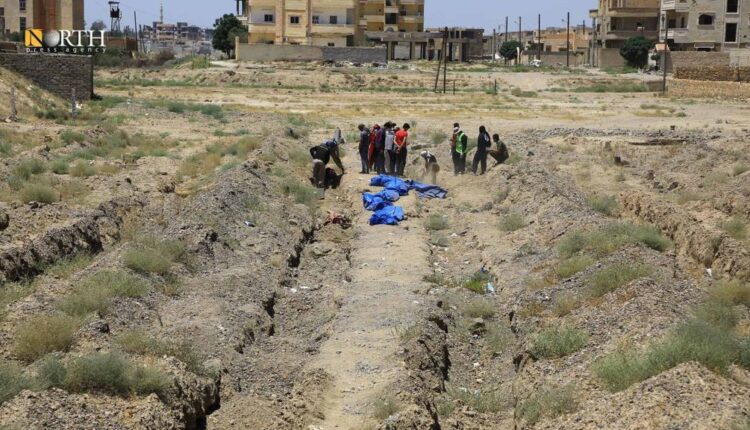
RAQQA, Syria (North Press) – The Islamic State Organization’s (ISIS) Amaq News Agency announced killing 13 soldiers of the Syrian government forces in the desert that extends between Raqqa and Deir ez-Zor.
Since the announcement of its complete elimination in March 2019, ISIS has continued its sporadic operations in all of Syria and in the Syrian Badia (desert) in particular, taking advantage of its desert nature.
On June 21, Amaq released a video on its Telegram account showing ISIS militants targeting the Syrian soldiers near the village of al-Zamla in the desert between Raqqa and Deir ez-Zor.
The video showed masked militants shooting at a white bus, and then burning the bus with the corpses.
Inside the bus, the video showed people killed while wearing civilian clothes.
The Syrian state-run news agency, SANA, reported that the targeting has led to the killing of 11 soldiers and the injury of three others, in addition to the killing of two civilians.
The video revealed more than three ISIS militants shooting the bus, and committing mass executions.
Amaq reported that on June 19, ISIS militants “ambushed a bus carrying Syrian army soldiers while it was traveling on the road to the village of al-Zamla in the southern countryside of Raqqa, near the administrative borders between Raqqa and Deir ez-Zor.”
Amaq said that after burning the bus, the militants went back to their hideouts.
Global fear
The US Congressman, Mark Waltz, warned that the decline in the US interests in the war against terrorism would pave the way for the extremist organizations to resurface again.
“The War on Terror is not over. ISIS & Al Qaeda will re-emerge and attack America again if we let them,” said the congressman via a tweet on his twitter account on June 16.
Waltz indicated in his tweet that the US-led coalition’s recent arrest of a senior ISIS leader in northwestern Syria is an indication of the organization’s enduring danger and its ability to resist and be active on the ground.
In a statement published on June 16, Operation Inherent Resolve (OIR) said, “Coalition forces detained a senior Daesh [ISIS] leader during an operation in Syria June 16.”
OIR is the US military’s operational name for the international military coalition’s intervention against ISIS in Iraq and Syria, which started in August 2016.
According to the statement, the detained leader was assessed to be an experienced bomb maker and one of the top ISIS leaders in Syria.
People and officials in north and east Syria fear that the latest Turkish threats of launching a military operation in northern Syria would lay the ground for ISIS to reorganize its ranks.
On June 2, the Commander-in-Chief of the Syrian Democratic Forces (SDF), Mazloum Abdi, said that ISIS still poses a threat to the region and that the Turkish threats will negatively affect the campaign against the organization’s sleeper cells.
On April 9, Qassim al-Araji, the Iraqi National Security Adviser, said at a conference at the al-Nahrain Center, which included ambassadors of Western countries and representatives of United Nations agencies, that the extremist organization “still poses a real threat in Hawl Camp.”
The camp, 45 km east of the city of Hasakah, is a house for 56,775 people, the majority of them are Iraqis. The wives and children of the foreign dead and detainees of ISIS members live in a special sector in the camp.
Since the beginning of 2022, eighteen women have been killed, according to the camp’s management.
Responsibility
Muwaffaq al-Ahmad, spokesman for the Future Syria Party, criticized the Syrian government for its inaction in fighting ISIS, and blamed it for the increased activities of the organization’s cells in the Syrian Badia.
He described its fight against ISIS cells as being limited to achieving “political gains.”
The organization’s activity in the Syrian Badia “is in the interest of Damascus to show itself as a force committed to fighting terrorism, and hence, achieving gains in the international community,” al-Ahmad added to North Press.
Al-Ahmad added that Damascus is responsible for everything that happened and is happening in Syria.
Damascus is part of the political solution, as it is internationally recognized as the legitimate government. However, “when it does not stand in front of the Turkish threats to occupy the Syrian territory, and does not seriously fight terrorism, we cannot take it seriously as part of the solution,” al-Ahmed said.
